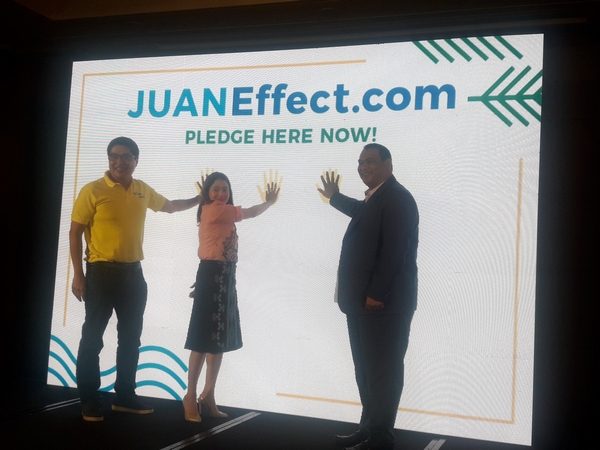
Lance Gokongwei, president and CEO of Cebu Pacific Air (left), leads the launching of the sustainable tourism program “Juan Effect.” Tourism Secretary Bernadette Romulo-Puyat (center) and Tourism Undersecretary Sherwin Rigor attended the recently held event in Metro Manila. CDN photo/ Cris Evert Lato-Ruffolo
MANILA — Low-cost carrier, Cebu Pacific Air (CEB), announced yesterday (July 31) its sustainable tourism program which advocates for responsible travel and environmental protection.
Called Juan Effect, the program is a joint undertaking with the Department of Tourism (DOT) which aims to “engage travelers and local stakeholders to mitigate the environmental impact of tourist arrivals.”
“The Juan Effect program is a call for all stakeholders to come together, collaborate and cooperate towards concerted efforts to ensure that the tourism industry progresses sustainably,” said Lance Gokongwei, Cebu Pacific president and chief executive officer.
Under the program, Cebu Pacific along with the DOT, Department of Environment and Natural Resources (DENR), local government units and tourism associations will work together to implement “sustainable tourism action plans.”
Gokongwei said Siargao was chosen as the site to implement the pilot module of the program because CEB was the first to fly to the island destination eight years ago.
“We saw the effect of tourism (on Siargao). Siargao is developing. We have a special affinity with Siargao. It’s like our anak (baby) that is growing up,” said Gokongwei in a press interview held after the formal launching at the Shangri-La Makati.
The program implementation will start on September 2018.
Gokongwei said the company recognizes sustainable tourism as a key priority for the airline as it aims to fly 22 million passengers in 2018.
Eco-friendly shift
In the same event, Gokongwei also announced the airline’s move to replace non-recyclable utensils with eco-friendly alternatives as part of its commitment to push for the reduction of inflight waste.
Cebu Pacific mounts an average of 400 flights on a daily basis covering 37 domestic and 26 international destinations.
These flights utilize approximately 18,500 pieces of plastic spoons and forks, cups and stirrers.
“We want to cut down on our use of non-recyclable plastic to only what is necessary and are committed to rolling out more initiatives to help protect our planet and ensure that we operate sustainably,” he said.
In a statement, Gokongwei said they will shift to bio-compostable cutlery made from polylactic acid (PLA) derived from cornstarch.
The shift will happen starting October 1, 2018.